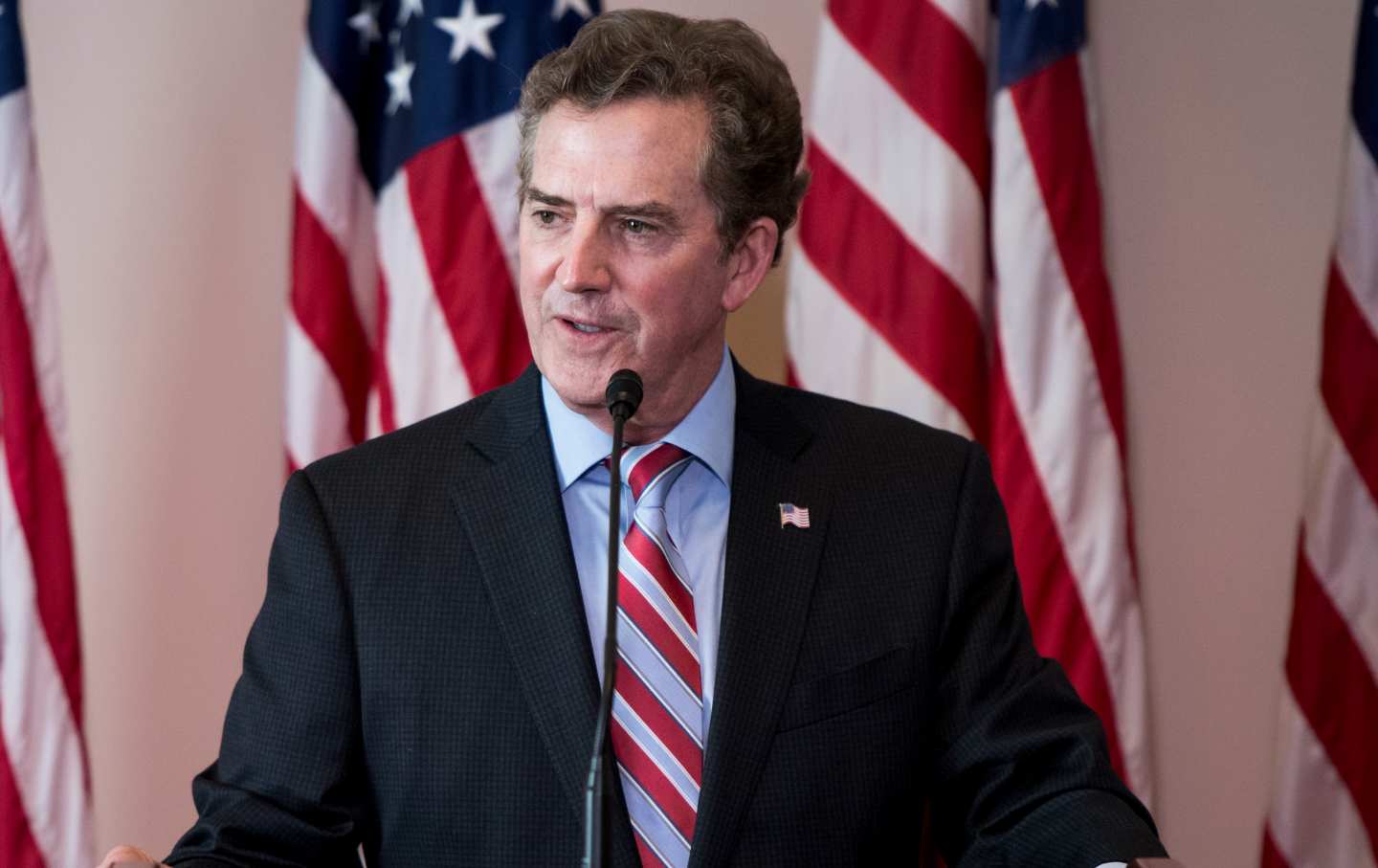
The party has strong candidates up and down the ballot, and a referendum could bring out enough young voters to turn this red state purple.
An abortion-rights protester holding a “No MO Abortion Bans” sign at a pro-choice rally in St. Louis, Missouri, on May 30, 2019.
(Photo by Saul Loeb / AFP via Getty Images)
Missouri used to be a swing state, where Democratic presidential candidates made last-minute campaign stops and sometimes won, and where Democrats frequently held the governorship and US Senate seats. Of the 25 presidential elections in the 20th century, Democrats won 14—even electing one of their own, Harry Truman, as vice president in 1944, and president in 1948. Bill Clinton carried the state twice and, as recently as 2008, Barack Obama came within 4,000 votes of winning it. The state sent a Democrat, Claire McCaskill, to the US Senate through 2018; and it had a Democratic governor, Jay Nixon, who made national headlines for blocking Republican attempts to restrict access to abortion. Now, however, Missouri has an anti-choice Republican governor, two extreme right-wing US senators, and a habit of voting for Donald Trump.
But could Democrats stage a comeback in Missouri in 2024, perhaps making Joe Biden’s reelection bid in the state competitive? Could the party’s likely US Senate nominee, progressive populist Lucas Kunce, have a fighting chance to flip the seat now held by Republican Josh Hawley? Is it a reasonable prospect that the party’s likely gubernatorial nominee, state House minority leader Crystal Quade, might renew Democratic control of the statehouse?
If access to abortion remains the winning issue that it has been since the US Supreme Court overturned national protections with its 2022 Dobbs decision, it is certainly within the realm of possibility that Missouri might renew its battleground-state status. That is because Missourians are now expected to vote in November on a high-stakes abortion rights referendum that could shake up the state’s politics.
The lesson from recent elections around the country is that a referendum of this sort has the potential to significantly increase turnout by pro-choice voters. A significant portion of those voters could, in turn, boost Democratic races for national and state posts.
Missourians for Constitutional Freedom, a coalition of reproductive health care advocates that has been campaigning to place an abortion amendment on the fall ballot, needed to file 171,592 valid signatures by the end of last week to secure a ballot spot. On Friday, the deadline for filing signatures, a long line of activists began delivering to the Missouri secretary of state’s office boxes containing more than 380,000 signatures. That’s double the requirement for qualifying for a November referendum vote on overturning Missouri’s abortion ban and codifying reproductive rights in Missouri’s state constitution.
Current Issue

“Our message is simple and clear,” says Tori Schafer, an American Civil Liberties Union lawyer and spokesperson for the campaign. “We want to make decisions about our bodies free from political interference.”
There is no question that support for abortion rights crosses political lines. Republicans in a number of red states have joined Democrats in backing ballot measures protecting reproductive rights, and that will surely be the case if there’s a November referendum vote in Missouri.
But Democrats believe that the Missouri referendum, like similar ballot initiatives in Florida and Arizona, could also attract young people and other likely pro-choice voters to the polls. The Democratic hope is that these voters would not only back the referendum but also boost the fortunes of Biden, Kunce, and Quade.
Quade, in particular, has been an outspoken advocate for a referendum. That’s primarily because she is a committed supporter of abortion rights who wants to defend personal freedoms. But as a savvy political figure who leads her party’s caucus in the state House, Quade is well aware of the impact that popular support for abortion rights has had in recent election cycles.
When abortion rights issues are on the ballot, even in states that lean Republican, voters show up to defend reproductive rights. And that often benefits Democrats. Since the Supreme Court’s 2022 decision in the Dobbs case, voters in California, Kansas, Kentucky, Michigan, Montana, Ohio, and Vermont have backed abortion rights. Two of those states, Kansas and Kentucky, are states that backed Trump in 2016 and 2020 and yet have elected and reelected Democratic governors who support abortion rights. And it’s worth noting that Michigan’s November 2022 referendum on abortion rights gave a big boost to Democrats, who won full control of the state legislature for the first time in decades. After the 2023 off-year elections produced big wins for pro-choice Democrats in Kentucky, Virginia, and New Jersey, the New York Times headline read, “Abortion Rights Fuel Big Democratic Wins, and Hopes for 2024.”
This spring, when the Florida Supreme Court cleared the way for a November referendum on abortion rights in that state, CNN reported that the decision “delivered a burst of Democratic optimism that this once-purple battleground could flip blue again.” Biden campaign manager Julie Chavez Rodriguez declared that Florida was suddenly “winnable.”
Florida is an easier state for Democrats than Missouri. Biden got 48 percent of the vote in the Sunshine State in 2020, while he got just 41 percent in the Show Me State. In addition, Missouri voters have shown a tendency to take progressive stands when voting on referendums—as they did in 2018, when they overturned the state’s anti-labor “right-to-work” law by a 67-33 margin—and still elect Republicans to statewide posts. But this year, Biden’s running against a 91-times indicted Trump, while Kunce is targeting Hawley as a senator who encouraged efforts to overturn the 2020 election results and then fled the Capitol when Trump backers he had greeted with a clenched fist of solidarity stormed the building on January 6, 2021. Hawley’s also one of the Senate’s most ardent foes of abortion rights, while Kunce is an equally ardent supporter of reproductive rights who says he wants to prevent “control-freak politicians” from imposing their will upon women.
“This fight is about our rights and power—the right to an abortion and the power to control our own lives,” Kunce says of his challenge to Hawley. “I’ll fight to end the filibuster and enshrine reproductive rights and abortion rights into law.”
With the prospect that the referendum fight will raise the stakes in November, there will be added attention to the abortion rights stances of Kunce and Quade. That won’t assure victory. But it could make races up and down the Missouri ballot considerably more competitive.
If national Democrats decide to go all in for Missouri, as it appears they will do for Florida, the political dynamic could shift. And this reddish state might once more be the sort of battleground state where Democrats have a path to victory.
Popular
“swipe left below to view more authors”Swipe →
Thank you for reading The Nation!
We hope you enjoyed the story you just read, just one of the many incisive, deeply-reported articles we publish daily. Now more than ever, we need fearless journalism that shifts the needle on important issues, uncovers malfeasance and corruption, and uplifts voices and perspectives that often go unheard in mainstream media.
Throughout this critical election year and a time of media austerity and renewed campus activism and rising labor organizing, independent journalism that gets to the heart of the matter is more critical than ever before. Donate right now and help us hold the powerful accountable, shine a light on issues that would otherwise be swept under the rug, and build a more just and equitable future.
For nearly 160 years, The Nation has stood for truth, justice, and moral clarity. As a reader-supported publication, we are not beholden to the whims of advertisers or a corporate owner. But it does take financial resources to report on stories that may take weeks or months to properly investigate, thoroughly edit and fact-check articles, and get our stories into the hands of readers.
Donate today and stand with us for a better future. Thank you for being a supporter of independent journalism.
Thank you for your generosity.
More from The Nation

A new lawsuit filed against the state of Nevada by the Trump team and its friends in the RNC says a lot about how they plan to suppress the vote in November.
Elie Mystal

The president’s ahistorical account of Gaza failed to acknowledge the discomfiting truth that brutalized communities can visit the same traumas on others.
Chris Lehmann

The trial isn’t about Trump’s bad behavior but committing business crimes to win an election. It’s a shame that Daniels’s story is being ruled largely irrelevant in the courtroom.
Joan Walsh

In remarkably short order, Donald Trump has transformed from the face of a hard-right insurgency in the GOP to the caretaker of the party’s future. This change has been anything bu…
Chris Lewis and Toni Aguilar Rosenthal

The system may be deeply imperfect, but the stakes are too high to refuse to cast a ballot for Biden on principle.
Back Talk
/
Alexis Grenell

